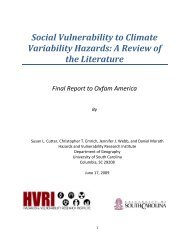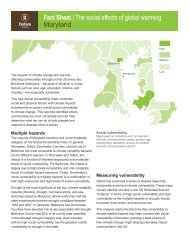Poverty Footprint Study on how the Coca Cola - Oxfam America
Poverty Footprint Study on how the Coca Cola - Oxfam America
Poverty Footprint Study on how the Coca Cola - Oxfam America
You also want an ePaper? Increase the reach of your titles
YUMPU automatically turns print PDFs into web optimized ePapers that Google loves.
Report methodology<br />
<strong>Coca</strong>-<strong>Cola</strong>, SABMiller and <strong>Oxfam</strong> commissi<strong>on</strong>ed<br />
comprehensive research in each country. It involved<br />
approximately three m<strong>on</strong>ths of field research in<br />
Zambia and El Salvador, including a number of data<br />
collecti<strong>on</strong> activities. In order to ensure a balance<br />
between management - and community-provided<br />
informati<strong>on</strong>, <strong>the</strong> data collecti<strong>on</strong> was split into two<br />
separate but complementary tracks: corporatefacing<br />
research and community-facing research.<br />
Both tracks focused <strong>on</strong> <strong>the</strong> same research areas<br />
as defined by a project research brief but employed<br />
different data collecti<strong>on</strong> tools. Whenever possible,<br />
<strong>the</strong> teams compared and c<strong>on</strong>trasted informati<strong>on</strong><br />
between corporate and community tracks. Overall,<br />
353 participated in El Salvador and 259 people<br />
participated in Zambia. The following tools were used:<br />
Interviews: The corporate researchers c<strong>on</strong>ducted<br />
interviews with <strong>the</strong> functi<strong>on</strong>al heads of companies<br />
throughout <strong>the</strong> <strong>Coca</strong>-<strong>Cola</strong>/SABMiller value chain.<br />
The community research teams interviewed key<br />
uni<strong>on</strong> members, transportati<strong>on</strong> workers, NGOs,<br />
community leaders, business owners, members of<br />
communities that share resources with <strong>Coca</strong>-<strong>Cola</strong>,<br />
municipal authorities, households and c<strong>on</strong>sumers.<br />
Focus group discussi<strong>on</strong>s: The research teams<br />
c<strong>on</strong>vened focus groups in both countries with workers<br />
from bottling plants, workers from sugar mills,<br />
casual and n<strong>on</strong>uni<strong>on</strong>ized workers in <strong>Coca</strong>-<strong>Cola</strong> and<br />
SABMiller, micro distributi<strong>on</strong> owners and workers,<br />
migrant and former migrant workers to discuss<br />
labour practices. Focus groups were also c<strong>on</strong>vened<br />
c<strong>on</strong>sumers and community members to address<br />
issues of marketing, c<strong>on</strong>sumpti<strong>on</strong> and nutriti<strong>on</strong>.”<br />
Informal, n<strong>on</strong>-representative surveys were<br />
undertaken with actors across <strong>the</strong> value chain<br />
including sugar-cane producers and workers,<br />
sugar mill workers, bottling plant workers as well as<br />
distributi<strong>on</strong> and retail business owners and workers.<br />
Livelihood surveys: Surveys were undertaken<br />
with sugarcane producers and workers, sugar<br />
mill and bottling plant workers, business owners,<br />
households that depend <strong>on</strong> water resources which<br />
80 Exploring <strong>the</strong> links between internati<strong>on</strong>al business and poverty reducti<strong>on</strong><br />
SABMiller bottling plants also utilize, distributors<br />
and retailers from different income areas,<br />
entrepreneurs, employees of NGOs and<br />
local residents.<br />
Marketing and c<strong>on</strong>sumer practices surveys: An<br />
informal survey <strong>on</strong> c<strong>on</strong>sumpti<strong>on</strong> patterns and<br />
percepti<strong>on</strong>s was administered to participants at all<br />
levels of <strong>the</strong> value chain. In additi<strong>on</strong>, distributors<br />
and retailers from different income areas answered<br />
questi<strong>on</strong>s <strong>on</strong> <strong>how</strong> products and marketing practices<br />
affect local cultural practices. A n<strong>on</strong>representative<br />
group of schools, nearby residents, c<strong>on</strong>sumers and<br />
various <strong>Coca</strong>-<strong>Cola</strong> product c<strong>on</strong>sumers answered<br />
questi<strong>on</strong>s <strong>on</strong> c<strong>on</strong>sumpti<strong>on</strong> patterns, nutriti<strong>on</strong><br />
awareness and o<strong>the</strong>r issues.<br />
Direct observati<strong>on</strong>s: In Zambia, <strong>the</strong> research team<br />
also c<strong>on</strong>ducted observati<strong>on</strong>s at water collecti<strong>on</strong><br />
points and at latrine sites in communities near<br />
company plants. In El Salvador, observati<strong>on</strong><br />
occurred at local water sources, retail stores and<br />
third-party distributi<strong>on</strong> centers.<br />
After this investigative process, <strong>the</strong> operati<strong>on</strong>al<br />
team devised a number of recommendati<strong>on</strong>s,<br />
which are noted at <strong>the</strong> end of each chapter. These<br />
recommendati<strong>on</strong>s should be seen as guiding<br />
principles and suggesti<strong>on</strong>s for acti<strong>on</strong>, and not as<br />
formal commitments made by ei<strong>the</strong>r The <strong>Coca</strong>-<strong>Cola</strong><br />
Company or SABMiller. For more informati<strong>on</strong><br />
about <strong>the</strong> report research methodology, please visit:<br />
www.oxfamamerica.org/povertyfootprint.




